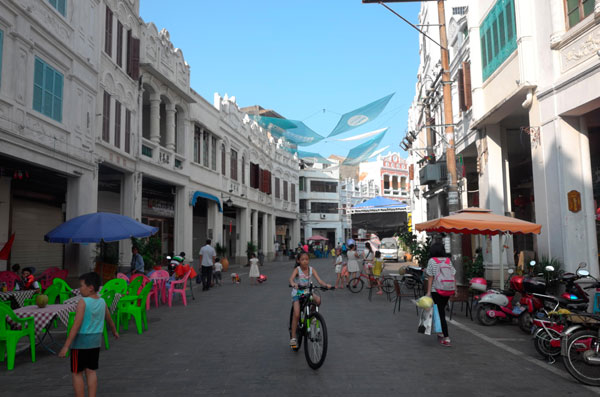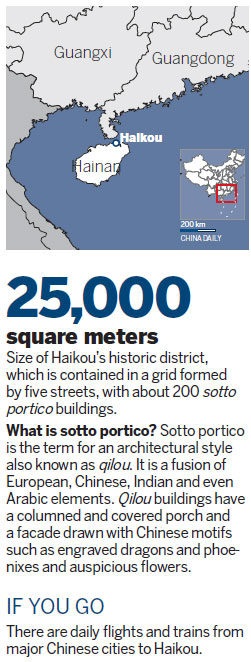Reliving Haikou's glory days
Updated: 2014-11-22 10:14
By Raymond Zhou and Huang Yiming(China Daily)
 |
|
[Photo by Huang Yiming/China Daily] |
Actually, qilou, with its most distinctive touch from Spanish or Italian architecture, has more than two styles. It is a fusion of European, Chinese, Indian and even Arabian architectural elements. A qilou facade may give the first impression of being exotic, but on closer examination may contain many Chinese motifs such as engraved dragons and phoenixes and auspicious flowers. But above all, qilou has a columned and covered porch available to all pedestrians. It provides shelter from the elements and effectively functions as a sidewalk during frequent rains. At the same time, the space is fully utilized with merchandise spilling out from the stores proper to attract impulse purchases.
A five-story building on Deshengsha Street was a landmark when it was erected in 1935. For the ensuing 26 years, it was the tallest building in Haikou, and also a luxury hotel that attracted the local high society and visiting dignitaries with its entertainment attractions including ballroom dancing, movie screening and coffee shops. It was built by Wu Kunnong, whose father made his fortune in Saigon, Vietnam, now known as Ho Chi Minh City. Much of the building materials were shipped from overseas.
Overseas Chinese not only brought back exotic architectures, but also lifestyle options such as coffee and tea. The teashop is said to be an invention of the forebears from Nanyang. It gained in popularity to the point it has now turned into a local ritual - with people, young and old, congregating in teashops and chatting for as long as a whole day. "We have a slower pace of life here," says one Haikou youngster whose greeting is "Come to tea with me." And now this form of relaxation is affectionately called "old daddy's tea".
Many cafes and teashops are now revived. Coffee connoisseurs should take time to sample the local brews as Hainan is famous for some of the best coffee beans in China. They taste different from the name brands popularly available in supermarkets. But you may grow to love their special aroma and buy packets of the instant kind as souvenirs for your friends.
